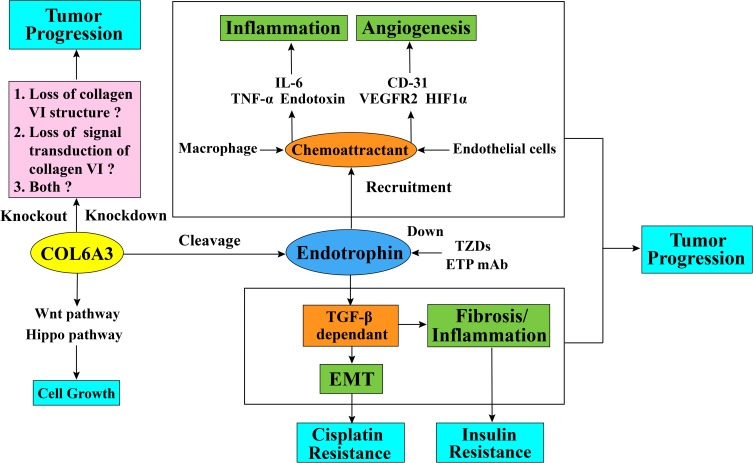Figure 3.
Schematic diagram of collagen alpha-3 (VI) chains and endotrophin function in tumor progression and cisplatin resistance. The collagen alpha-3 (VI) chain C5 domain fragment endotrophin regulates tumor EMT and fibrosis through a TGF-β-dependent pathway. Endotrophin can also promote tumor inflammation through the recruitment of macrophages and enhances the expression level of inflammatory cytokines, such as IL6 and TNF-α, or through the recruitment of endothelial cells into the tumor microenvironment to promote tumor angiogenesis and increase the expression level of angiogenesis markers, such as CD31, VEGFR2, and HIF1α. It is not clear whether the effect of collagen alpha-3 (VI) chain on tumor behavior is by affecting the collagen VI structure stability, either by affecting the signal transduction ability of collagen VI molecules, or both. In terms of drug resistance, endotrophin can induce tumor cells to resist cisplatin through the TGF-β-EMT pathway, and treatment with endotrophin mAb or TZDs can block this process by downregulating endotrophin levels and eventually give rise to increased cisplatin sensitivity. Additionally, COL6A3 is highly expressed in densely growing mouse embryonic fibroblasts (MEFs) and promotes the 3D growth of MEFs by suppressing the Hippo signaling pathway and promoting the Wnt signaling pathway.
Abbreviations: TGF-β, transforming growth factor beta; EMT, epithelial–mesenchymal transition; IL-6, interleukin 6; TNF-α, tumor necrosis factor alpha; CD-31, cluster of differentiation 31; VEGFR2, vascular endothelial growth factor receptor 2; HIF1α, hypoxia-inducible factor 1α; ETP, endotrophin; mAb, monoclonal antibodies; TZDs, thiazolidinediones.

